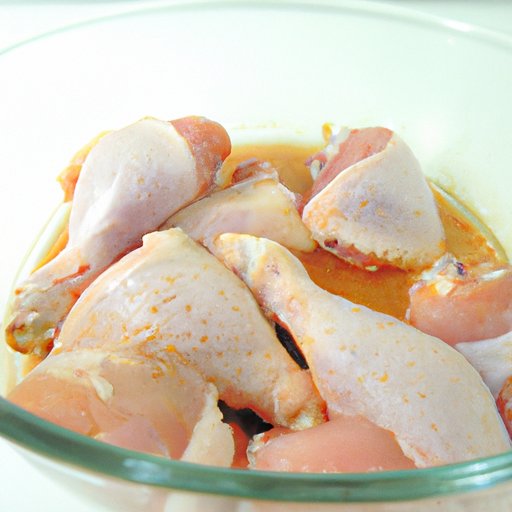
Introduction
Have you ever spent hours perfecting a chicken recipe only to find the meat is tough and chewy? Tough chicken can ruin an otherwise excellent meal. The good news is that there are many ways to tenderize chicken, which we’ll explore in this article. Some of these ways are found in recipes, while others are based on science, tools, cooking methods, and even time.
Recipe-based Methods
Recipes that require tenderized chicken often use acidic ingredients such as lemon, lime, or vinegar, which breaks down the tough fibers of the chicken. One example is the classic Italian dish, chicken piccata. The chicken is placed in a flour coating, sautéed until golden brown, and then simmered in a sauce made of lemon juice, chicken broth, butter, and capers. The acid in the lemon juice helps tenderize the chicken while adding a bright, fresh flavor.
Another great recipe that tenderizes chicken is a classic Asian marinade. Soy sauce, ginger, garlic, and rice wine vinegar are combined to create an acidic marinade. The chicken can be marinaded for as little as an hour or overnight, depending on the recipe. Once the chicken is marinated, it can be grilled, sautéed, or baked.
To adapt these methods for other recipes, try experimenting with different types of acids and herbs. Pineapple juice, buttermilk, and yogurt all have acidic properties that can help break down the fibers in chicken. Adding herbs like rosemary and thyme can also help tenderize the chicken.
Science-based Methods
Ever wondered why chicken can be tough? The heat of cooking causes the proteins in meat to denature and coagulate, making them firm and chewy. Some scientific methods for tenderizing chicken include using enzymes and salt.
Enzymes such as papain (found in papaya) and bromelain (found in pineapple) are natural tenderizers. These enzymes break down the proteins in meat, making it softer. This method is often used in Chinese cooking to tenderize beef. To use this method with chicken, you can marinate it in a puree made from fresh pineapple or papaya.
Another scientific method is salting. Salt draws moisture out of the meat, creating a brine that helps break down the muscle fibers. Dry-brining is a simple way to tenderize chicken. Simply sprinkle kosher salt on both sides of the chicken and let it rest in the fridge for several hours or overnight before cooking.
Tool-based Methods
Tools such as meat mallets, forks, and bladed tenderizers can be used to tenderize chicken. A meat mallet or tenderizer can help to break down the muscle fibers and create a thinner, more even cut of meat. Be sure to use a mallet with a flat side so that it doesn’t completely destroy the chicken.
A bladed tenderizer has sharp, thin blades that pierce the meat as it is pressed. This method can be more effective than a mallet as it breaks up the connective tissue that makes the meat tough. However, it should be used with care as the blades can be dangerous.
Cooking-method-based Methods
Cooking methods such as braising and slow cooking are great ways to naturally tenderize chicken. These methods use low heat and moisture to break down the fibers in meat over time. Braising involves searing chicken first and then cooking it in a covered pot with liquid, such as chicken broth or wine, until the meat is moist and tender.
Slow cooking involves cooking chicken on low heat for several hours until the meat is soft and falls off the bone. This method usually involves adding a liquid to the pot, such as tomato sauce or broth.
Time-based Methods
Marinading is another effective time-based method for tenderizing chicken. The longer the chicken sits in the marinade, the more tender it will become. The duration of marinading depends on the type of marinade and cut of chicken. Acidic marinades, which include lemon juice or vinegar, work quickly, and chicken only needs to marinate for a short time, usually 30 minutes to an hour.
Marinades that are less acidic, such as those including olive oil and herbs, can be marinated for longer, usually up to eight hours or overnight. Marinades that include salt or soy sauce may also benefit from a longer marinating time to allow the flavors to fully penetrate the chicken.
Conclusion
There are many ways to tenderize chicken, from acidic marinades to scientific methods to tools and time-based methods. The key is to experiment and find what method works best for you and your recipe. Whether you are searing, stewing, marinating, or using a meat tenderizing tool, the result will be a delicious, tender chicken that everyone will love.





